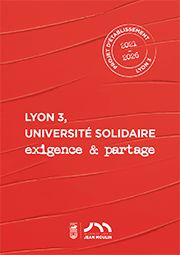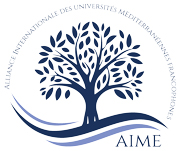AccueilRechercheProgrammes et productions scientifiquesThèsesThèses soutenuesThèses soutenues - 2006-2021Thèses soutenues - 2018
-
Partager cette page
- Recherche,
ONGOTHA Charlène
La prévention des conflits dans l’espace francophone africain : étude des démarches et des actions de l’Organisation internationale de la Francophonie
Publié le 4 juillet 2018 – Mis à jour le 13 décembre 2018
Thèse en Droit mention droit international et relations internationales, soutenue le 5 juin 2018.
Le siècle actuel est un siècle axé sur la protection des êtres humains contre les périls imminents qui menacent leur existence et que sont, pour n’en citer que quelques-uns, la pauvreté, la maladie et la faim. Aussi, face à l’explosion des conflits internes, les débats sur la sécurité ont beaucoup évolué ces dernières années et ont conduit à la reconnaissance et à l’affirmation de la sécurité humaine en droit international. Cette situation aura une certaine incidence sur le système international et les débats sur la prévention des conflits du début du millénaire. Organisation politique et culturelle, la Francophonie intègre cette nouvelle conception de la sécurité dans ses actions de prévention structurelle des conflits dont le but est d’agir sur les causes profondes des conflits en travaillant principalement à l’édification d’un État de droit au service des populations civiles. L’espace francophone africain est particulièrement concerné par cette conflictualité politique extrêmement violente, ce qui justifie la légitimité de l’Organisation internationale de la Francophonie dans ce domaine. Pour autant, peut-elle être un acteur novateur de la prévention devant la multitude d’acteurs qui multiplient les interventions sur le continent et disposent de plus de moyens d’actions ? A-t-elle la capacité de rassembler l’ensemble de ses États membres sur des sujets d’intérêt commun et particulièrement, sur la prévention ? Ses programmes sont-ils un simple accompagnement des programmes internationaux, ou un complément utile et pertinent ? Autant de questions auxquelles nous tenterons d’apporter des réponses tout au long de cette recherche.
The current century is a century of protecting human beings against the imminent perils threatening their existence, and to mention but a few, proverty, disease and hunger. Also, faced with the explosion of internal conflicts, debates on security have evolved considerably these last years leading to the recognition and affirmation of human security in international law. This situation will have some impact on the international system and debates on conflict prevention at the turn of the millenium. As a political and cultural organization, La Francophonie integrates this new conception of security into its structural conflict prevention actions, the purpose of which is to act on the root causes of conflict by working primarily to build the rule of law in the service of civilian populations. The African Francophone area is particularly concerned by this extremely violent political conflict, which justifies the legitimacy of the International Organization of La Francophonie in this area. However, can it be an innovative actor of prevention in front of the multitude of actors who multiply the interventions on the continent and have more means of actions ? Does it have the capacity to bring together all of its Member States on topics of common interest and particularly on prevention? Are it's programs a simple accompaniment of international programs, or a useful and relevant complement? So many questions that we will try to provide answers throughout this research.
Mots-clés :
Francophonie – Prévention des conflits – Sécurité humaine – Droits de l’Homme – Développement – Alerte précoce – Responsabilité de protéger
Keywords :
Francophonie – Conflict Prevention – Human Security – Human Rights – Development – Early warning –Responsibility to Protect
Directeur(s).trice(s) de thèse : Mme Joëlle LE MORZELLEC
Membres du jury :
Mme Mireille COUSTON, Professeure des universités, Université Jean Moulin Lyon 3,
M. Jean du BOIS DE GAUDUSSON, Rapporteur, Professeur des universités émérite, Université de Bordeaux,
Mme Joëlle LE MORZELLEC, Directrice de thèse, Professeure des universités émérite, Université Paris Saclay,
M. Joseph MAÏLA, Professeur des universités, ESSEC Paris,
M. Frédéric RAMEL, Professeur des universités, Sciences Po Paris
Président.e du jury : M. Joseph MAÏLA
Equipe d'accueil : Francophonie
Décision : Admise
The current century is a century of protecting human beings against the imminent perils threatening their existence, and to mention but a few, proverty, disease and hunger. Also, faced with the explosion of internal conflicts, debates on security have evolved considerably these last years leading to the recognition and affirmation of human security in international law. This situation will have some impact on the international system and debates on conflict prevention at the turn of the millenium. As a political and cultural organization, La Francophonie integrates this new conception of security into its structural conflict prevention actions, the purpose of which is to act on the root causes of conflict by working primarily to build the rule of law in the service of civilian populations. The African Francophone area is particularly concerned by this extremely violent political conflict, which justifies the legitimacy of the International Organization of La Francophonie in this area. However, can it be an innovative actor of prevention in front of the multitude of actors who multiply the interventions on the continent and have more means of actions ? Does it have the capacity to bring together all of its Member States on topics of common interest and particularly on prevention? Are it's programs a simple accompaniment of international programs, or a useful and relevant complement? So many questions that we will try to provide answers throughout this research.
Mots-clés :
Francophonie – Prévention des conflits – Sécurité humaine – Droits de l’Homme – Développement – Alerte précoce – Responsabilité de protéger
Keywords :
Francophonie – Conflict Prevention – Human Security – Human Rights – Development – Early warning –Responsibility to Protect
Directeur(s).trice(s) de thèse : Mme Joëlle LE MORZELLEC
Membres du jury :
Mme Mireille COUSTON, Professeure des universités, Université Jean Moulin Lyon 3,
M. Jean du BOIS DE GAUDUSSON, Rapporteur, Professeur des universités émérite, Université de Bordeaux,
Mme Joëlle LE MORZELLEC, Directrice de thèse, Professeure des universités émérite, Université Paris Saclay,
M. Joseph MAÏLA, Professeur des universités, ESSEC Paris,
M. Frédéric RAMEL, Professeur des universités, Sciences Po Paris
Président.e du jury : M. Joseph MAÏLA
Equipe d'accueil : Francophonie
Décision : Admise
Documentation
Mise à jour : 13 décembre 2018







